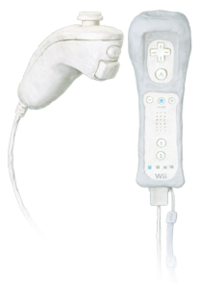Wii: Difference between revisions
m (9 revisions) |
(editing page for Pikmin Wiki migration (internals note: from file: 'importjson-mergemain--')) |
||
| Line 1: | Line 1: | ||
{{merging|conflict|Nintendo Wii}} | |||
{{game icons|p=y|p2=y}} | {{game icons|p=y|p2=y}} | ||
[[File:Wiimotea.png|thumb|A Wii.]] | [[File:Wiimotea.png|thumb|A Wii.]] | ||
Revision as of 17:30, August 19, 2014
|
This page is part of the merge with Pikmin Wiki, and needs resolving. Please bear with us as we do so. Before the import, this subject had a page both on Pikipedia and Pikmin Wiki. You are currently reading the Pikipedia version, and the Pikmin Wiki version can be found here. Both versions need to be manually merged together and placed on the current page. At Pikmin Wiki, this page was called "Nintendo Wii", which is likely different from the current title. It might make sense to rename this page. |
The Wii is Nintendo's fifth home console, released in late 2006. Its controller is the first in a Nintendo video-game system to use a motion sensor to control games. It is capable of playing Nintendo GameCube games and so can play both Pikmin and Pikmin 2. The respective New Play Control! versions of each of these are specifically for the Wii, and use its motion controls. Super Smash Bros. Brawl is also played on this console, which has Olimar and Pikmin as a playable character.
In 2008 it was announced that 'Pikmin 3 was planned for the Wii.[1] However, at E3 2011 it was announced that Pikmin 3 would instead be released on the Wii U.[2]
Controller
The Wii's main controller is the Wii Remote (also known as Wiimote), which has the shape of a regular television remote. This controller has several extra peripherals, most importantly, the Nunchuk. The Wii Remote has six buttons (plus the Home (![]() ) button, which allows reconnection of controllers, resetting the game and other options regardless of which game is being played) and a D-Pad (
) button, which allows reconnection of controllers, resetting the game and other options regardless of which game is being played) and a D-Pad (![]() ), as well as a pointer on the front which can tell its own position in relation to a motion sensor (placed in front of the television set) and motion detection technology. The Nunchuk can be connected and disconnected from the Wii Remote and has two triggers, the Z (
), as well as a pointer on the front which can tell its own position in relation to a motion sensor (placed in front of the television set) and motion detection technology. The Nunchuk can be connected and disconnected from the Wii Remote and has two triggers, the Z (![]() ) and C (
) and C (![]() ) buttons, as well as an analog stick (
) buttons, as well as an analog stick (![]() ), but limited motion detection.
), but limited motion detection.
